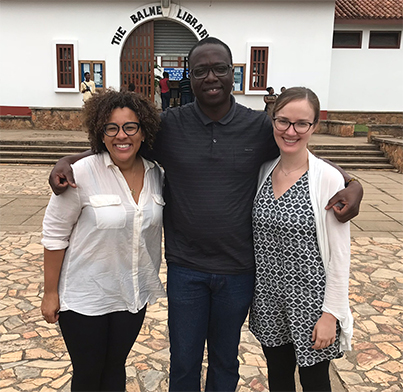Drs. Heidi Burns and Nakita Natala, both in the final months of their fellowship training at UMMS, have been named Fogarty Center Global Health Fellows, a National Institutes of Health-funded program that sends post-doctoral scholars all over the world for immersive, 12-month global health research projects.

They will be working at Komfo Anokye Teaching Hospital (KATH), a longtime UMMS partner institution where the Michigan Medicine psychiatry department has been actively working to build collaborations. Both women visited KATH last year for month-long rotations, experiences that motivated and shaped their recently awarded Fogarty Center fellowship proposals.
“We learned so much from our Ghanaian colleagues in the short time we were there. They are fired up about improving mental health services, so it was inspirational,” said Natala, MD. “I am excited to get back there.”
Natala’s work will explore expanding services for children with developmental disabilities, while Burns’ research will focus on suicide. The two women are among more than a dozen Michigan Medicine scholars who’ve garnered global health fellowships since 2012, working in places like China, Ghana, Thailand, and Uganda, although they are first in recent memory to work on projects which specifically address mental health.
“I wish to congratulate Drs. Natala and Burns on their Fogarty Fellowship awards and their dedication to global health,” said Senior Associate Dean for Education and Global Initiatives Joseph Kolars, MD. “Globally, there is an increasing recognition of the burden of disease from poor mental health and psychiatric conditions. However, research on appropriate interventions is lagging, particularly in low- and middle-resource countries. Programs like this to address that gap require a significant commitment – from both the Fellows and their partners in Ghana – but the potential impact is well worth the effort.”
Studying, addressing suicide
Burns’ project seeks to identify the incidence rates, risk factors, and more about suicide attempts in Ghana. The project proposes to gather retrospective and prospective data on patients.
“We plan to take this amazing wealth of data and look through it to see what we can learn out what the suicide information. It's impossible to start a prevention program when you don’t have the data.”
In addition to the retrospective data analysis, she will gather more specific data on future patients and survey care providers on their perceptions and approaches to treating patients following a suicide attempt. Greater provider awareness and better screening tools could help patients get a proper diagnosis and care.
“There has been limited research on provider attitudes toward suicide in Ghana,” Burns said. “We plan to explore the way people feel about it and how those feelings might impact patient care.”
Diagnosing developmental disorders
Natala’s project focuses on children with developmental disorders, an at-risk population that is often underserved in places like Ghana due to workforce shortages, stigma and lack of resources needed to care for these complex children with high medical and psychiatric needs.

Working with colleagues in KATH’s psychiatry department and primary care providers, Natala plans to introduce an evidenced based, culturally sensitive screening tool, The Ten Question Screen, that could help standardize the way providers identify and diagnose children with developmental disorders. Developmental disorders is an umbrella term that includes autism spectrum disorder, intellectual disability and cerebral palsy. To shape the project, Natala has partnered with a KATH psychiatrist who has a master’s degree in child psychiatry, one of just a few general psychiatrists in all of Ghana with such specialized training in child and adolescent mental health.
“In talking with him, I learned that the pediatricians, family doctors, and nurses are trying to figure out how to better care for children with developmental disabilities but there is not a standard process in place for how to screen, diagnose and treat these children at KATH,” Natala said. “It would make the process easier if there was a tangible screening tool to use as a guide which could be linked to some simple resources to give parents to help promote their child’s development, like exercises or techniques to do at home.”
A welcome surprise
Both Natala and Burns are wrapping up their fellowship programs in the psychiatry department this month. They will leave in July for a short orientation and training program at the NIH headquarters in Bethesda, MD, before heading to Kumasi, in central Ghana, for 11 months.
“We were well aware that there were no guarantees going in that both proposals would be accepted. We were prepared for that possibility, so this was a welcome surprise,” said Burns. “It’s undeniably comforting to know that I’ll have a close colleague who will be there. Having that support, emotionally and academically, will be invaluable.”
Their projects are made possible through the Fogarty Center’s Northern Pacific Global Health Research Training Consortium, a partnership between the universities of Washington, Michigan, Hawaii, Minnesota and Indiana. The schools nominate fellows for 12-month international research projects, leveraging their collective institutional partnerships to connect the awardees with collaborating mentors in low- to middle-income countries.
“Being at UM has been an incredible opportunity because it’s a Fogarty site, there strong ties to Ghana, and there is a lot of interest in growing those connections,” said Natala. “I feel incredibly fortunate to be a part of the Michigan family. I don’t think I’d have had the opportunity at another institution, so I’m really thankful for that.”
